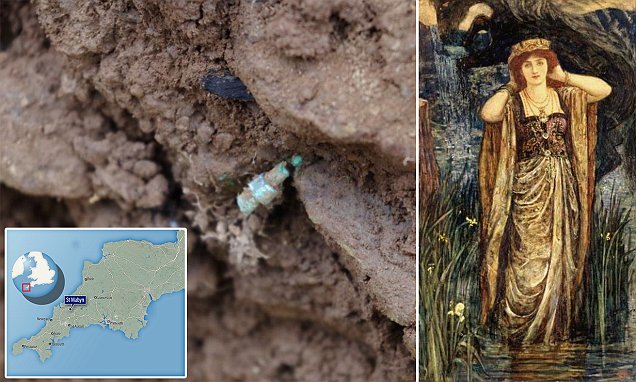‘Rare and significant’ brooch found at site linked to KING ARTHUR

Archaeologists stumbled across the “rare and significant” piece of jewellery and hailed it as the first evidence that the area was home to the rich and powerful during the time. The Romano-British brooch was discovered in a field at St Mabyn, Cornwall, less than a mile from Castle Killibury hill fort, previously identified as the origin of Arthur’s Camelot.
The discovery has now raised the prospect that the brooch might once have belonged to his queen, Guinevere.
The hill fort is today known as Castle Killibury and has not previously yielded much interest after being ploughed for centuries.
The brooch was found in a meadow known as Chapelfield, where developers are now seeking planning permission to build 14 houses.
The piece of jewellery is made of a copper alloy and archaeologists think it dates from the 5th or 6th century – around the time a real King Arthur might have lived.

Although many sites claim to be associated with Arthur, what makes the Castle Killibury hill fort of potential significance is that the connection was first suggested by Welsh writers.
Usually, claims are made to serve more parochial interests.
Romano-British copper alloy brooches signify that the people who lived here had some importance
The artefact is currently undergoing recording and conservation at the Royal Cornwall Museum.
The owners of the brooch, who also own the field where it was found, live in Malaysia.
But the publicly-available archaeological report attached to Cornwall Council’s planning documents says: “The brooch is a rare and significant find, suggestive of a reasonably ‘well-healed’ Romano-British farmstead settlement.”


The archaeologists were surprised by the discovery, as they had been expecting only medieval finds.
Some Arthurian scholars claim that the 11th-century Welsh tale of Culhwch and Olwen – thought to be the very first literary reference to a legendary King Arthur – placed his headquarters at “Celliwig in Cornwall”.
They suggest that the similarity of the name, and the fact that it is a hill fort from the right period in history, place the site at Castle Killibury.
Other scholars dispute this and say the Culhwch and Olwen story places Arthur’s headquarters in Wales.
The St Mabyn brooch was found in May and is described in a report written last month.
It comes just weeks after archaeologists, commissioned by English Heritage found evidence of an important Romano-British castle at Tintagel, long celebrated by poets as King Arthur’s birthplace.
